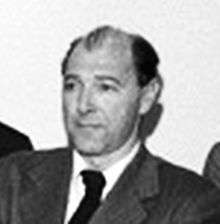Lester Cole
Lester Cole (June 19, 1904 – August 15, 1985) was an American screenwriter.
Lester Cole | |
|---|---|
 Lester Cole in 1947 | |
| Born | June 19, 1904 New York, New York |
| Died | August 15, 1985 (aged 81) San Francisco, California |
| Occupation | screenwriter |
Biography
Born to a Jewish family[1][2] in New York City, the son of Polish immigrants to the United States, his father was a Marxist garment industry union organiser, and Cole was a dedicated socialist from childhood.[3]
Lester Cole began his career as an actor but soon turned to screenwriting. His first work was If I Had a Million. In 1933, he joined with John Howard Lawson and Samuel Ornitz to establish the Writers Guild of America, and in 1934 joined the American Communist Party.
Between 1932 and 1947, Cole wrote more than forty screenplays that were made into motion pictures.[4]
Blacklisting
In 1947 he became one of the Hollywood Ten, who refused to answer questions before the House Committee on Un-American Activities about their Communist Party membership. Cole was convicted of Contempt of Congress, fined $1,000 and sentenced to twelve months' confinement at the Federal Correctional Institution at Danbury, Connecticut, of which he served ten months.
As a result of his refusal to testify, Cole was blacklisted by studio executives, after which just three of his screenplays were made into films - submitted under the names Gerald L.C. Copley, Lewis Copley, and J. Redmond Prior.
His best-known screenplay was that for the highly successful Born Free (1966), credited to Gerald L.C. Copley.
Later life
In 1981, Cole published his autobiography, entitled Hollywood Red: The Autobiography of Lester Cole. In it, he recounted a 1978 incident when he called into a radio talk show on which ex-Communist Budd Schulberg was a guest. According to Cole, he berated Schulberg (who had testified before HUAC as a friendly witness) on the air as a "canary" and a "stool pigeon" before he was cut off:
Aren't you the canary who sang before the un-American Committee? Aren't you that canary? Or are you another bird, a pigeon – the stool kind.... Just sing, canary, sing, you bastard![5]
About this incident, Kenneth Lloyd Billingsley (Hollywood Party: How Communism Seduced the American Film Industry) comments, "Whether this actually happened is uncertain, but one can guess."[6]
Lester Cole died of a heart attack in San Francisco, California, in 1985. Ronald Radosh, Emeritus Professor of History at City University of New York, wrote that Cole "remained a hardcore Communist" until his death.[7]
Selected filmography
- Painted Faces (1929)
- Walls of Gold (1933)
- Nothing More Than a Woman (1934)
- The Crime of Doctor Hallet (1938)
- Secrets of a Nurse (1938)
- Pirates of the Skies (1939)
- The House of the Seven Gables (1940)
- Among the Living (1941)
- None Shall Escape (1944)
- Blood on the Sun (1945)
- Objective, Burma! (1945)
- Men in Her Diary (1945)
- The Romance of Rosy Ridge (1947)
- High Wall (1947)
See also
- The Hollywood Ten documentary.
- Hollywood on Trial
References
- Cones, John. Motion Picture Biographies: The Hollywood Spin on Historical Figures. p. 35. ISBN 9781628941166.
- Brook, Vincent (December 15, 2016). From Shtetl to Stardom: Jews and Hollywood: Chapter 1: Still an Empire of Their Own: How Jews Remain Atop a Reinvented Hollywood. Purdue University Press. p. 17. ISBN 9781557537638.
- "Alvah Bessie (1904 – 1985) - The Hollywood Ten: The Men Who Refused to Name Names".
- Reynold Humphries (2008). Hollywood's Blacklists: A Political and Cultural History. Edinburgh University Press. pp. 54–. ISBN 978-0-7486-2455-3. Retrieved 2013-08-04.
Lester Cole, also one of the Ten, wrote two scripts dealing with war subjects: Hostages (1943) and None Shall Escape (1944).
- Cole, Lester (1981). Hollywood Red: The Autobiography of Lester Cole. Berkeley, Calif.: Ramparts Press. p. 428. ISBN 0-87867-085-8. Retrieved March 9, 2011.
- Billingsley, Kenneth Lloyd (1998). Hollywood Party: How Communism Seduced the American Film Industry in the 1930s and 1940s. Rocklin, Calif.: Prima Publishing. p. 267. ISBN 0-7615-1376-0. Retrieved March 9, 2011.
- Radosh, Ronald; Allis Radosh (2005). Red Star Over Hollywood. San Francisco: Encounter Books. p. 29. ISBN 1-893554-96-1. Retrieved March 9, 2011.
External links
- Lester Cole on IMDb.
- Works by Lester Cole at LibriVox (public domain audiobooks)

- Works by Lester Cole at LibriVox (public domain audiobooks)
